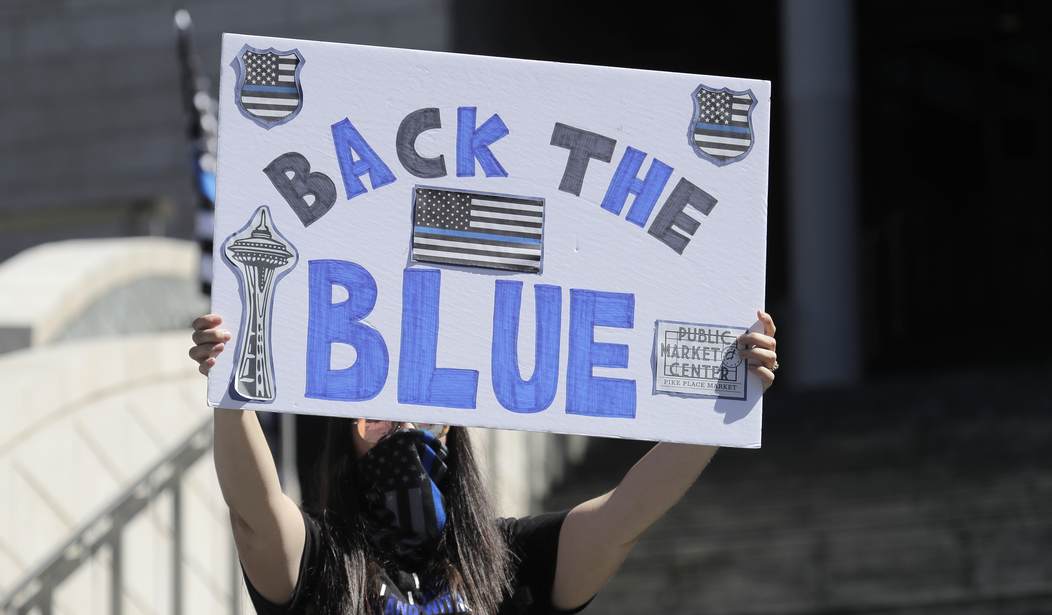In yet another strange sign of our times, an unusual arrest in Utah this week is drawing national attention. In the town of Panguitch, a police officer was making a routine traffic stop at a gas station. While talking to the motorist, the police officer observed a 19-year-old woman holding a “back the blue” sign in the parking lot. The woman threw the sign on the ground and stomped on it. She then picked it up, wadded it into a ball and threw it in the trash, all while “smirking in an intimidating fashion” at the officer.
The woman was questioned and arrested. She’s now been charged with criminal mischief with a hate crime enhancement, as well as disorderly conduct. The Salt Lake Tribune reports on the officer’s account of the incident.
“Due to [the woman] destroying property that did not belong to her in a manner to attempt to intimidate law enforcement, I placed her under arrest,” the affidavit says.
According to the affidavit, the allegations are being treated as a “hate crime enhanced allegation” due to “the demeanor displayed by [the woman] in attempts to intimidate law enforcement while destroying a ‘Pro Law Enforcement’ sign.”
While I remain a firm supporter of the Thin Blue Line, this entire incident is just peculiar, particularly when we see that the woman is facing a “hate crime” charge. The cop says that the woman was “evasive” about where she obtained the sign, eventually saying that she simply found it laying on the ground. That makes the entire “destruction of property” charge rather weak tea. And while I think law enforcement should be shown the proper amount of respect, saying unpopular or even offensive things (or physically acting out as she did) is still considered free speech.
The fact that this incident of admittedly rude behavior has now expanded into a hate-crime charge should give the most frequent accusers of such “crimes” on racial or gender grounds pause. At Reason, C.J. Ciaramella makes the point that these laws have become a two-way street, where almost anyone (including the police) can make such claims against people simply for saying something the listener finds disagreeable.
As Reason‘s Robby Soave wrote, such prosecutions are “good evidence that we ought to be skeptical of hate crime laws. Although intended to protect the underprivileged from bigotry and racism, they often permit the government to quell speech that is critical of authority.”
It’s not just hate crime laws, though. Police have employed a wide variety of laws against people exercising their protected First Amendment rights. Take for example the San Diego Police Department, which issued more than 80 tickets over the last decade for “seditious language” under an unconstitutional World War I–era law. The Voice of San Diego reported that the majority of the tickets were issued to minorities for allegedly using vulgarities.
That’s a rather mild assessment in my opinion. We need to be far more than “skeptical” of all of these hate crime laws. And contra Robby Soave, we don’t pass laws to protect a certain group of people. They are in place to protect everyone, not just “the underprivileged” or any favored political demographic.
Underlying all of this is the fact that “hate crime” laws are thought crime laws. The government isn’t supposed to be able to regulate what you are thinking or even what you are saying except under the most limited and extreme circumstances. You are allowed to think or even say hurtful things about people for whatever reason you may have. It’s your actions that matter and whether or not you are causing harm to persons or property.
If that young woman hates the cops, she’s certainly not the type of person I would want to hang around with and I would clearly question her attitude and rationality. But I would also defend her right to express her opinions. If you want to give her a ticket for littering or destroying someone else’s piece of cardboard (assuming you can identify the owner who suffered the loss of it), then go for it. The law is the law, after all. But if “smirking in an intimidating fashion” is now an actionable offense, our civil rights have decayed far more than even I had previously feared.








Join the conversation as a VIP Member